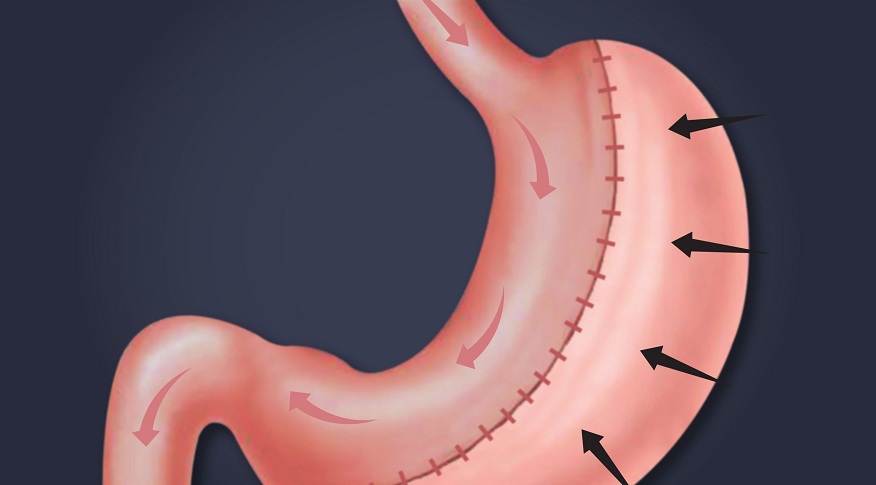Lap band surgery is a weight loss procedure that involves placing a ring around the top of the stomach, which slows down the passage of food and helps a person feel full more quickly. The goal of this surgery is to reduce food intake in order to promote weight loss. Lap band surgery can come with complications such as band slippage, heartburn, food intolerance, and inadequate weight loss. The good news is that lap band surgery can be revised. If patients encounter issues with their lap band, they can consult their bariatric surgeon to determine the appropriate course of action. There are numerous revision surgeries, including band to bypass revision or band to sleeve revision. Gastric band to bypass revision is a commonly preferred option. In this blog, we will provide a beginner’s guide to the band to bypass revision surgery.
What is Band to Bypass Surgery?
A Band to Bypass surgery is an effective solution for patients who have not achieved the desired weight loss from lap band surgery. During the band to gastric bypass revision, surgeons make adjustments to the stomach and small intestine, altering the absorption and digestion of food. They create a small pouch in the stomach through an incision, which is then connected to the lower part of the small intestine. About a meter and a half of the small intestine is removed in the process. This procedure restricts food intake, promotes satiety, and leads to significant weight loss. Experienced surgeons in the Dallas and Fort Worth community typically perform laparoscopic band to bypass revision as a one-step procedure, removing the lap band and performing the gastric bypass simultaneously. This is done through laparoscopy. However, in rare cases where scarring of the lap band occurs, the procedure may be performed in two stages. If you are considering a band to bypass revision surgery in Dallas and Fort Worth, it is advisable to consult an expert bariatric surgeon with a successful track record.
Need for Band to Bypass Surgery
Band to bypass surgery is commonly performed to modify and revise lap band surgery. Here are some reasons why patients opt for bypass surgery:
- Insufficient weight loss: It’s possible for patients who have undergone lap band surgery to not achieve their desired weight loss or experience weight regain over time. Revision surgery to gastric bypass can be an option for patients who are seeking more significant weight loss or better long-term results.
- Complications or side effects: Lap band surgery can lead to complications like band erosion, band slippage, or chronic reflux. These complications can cause discomfort, swallowing difficulties, or other health issues. In such cases, converting to gastric bypass surgery can help address the complications and improve overall health and quality of life.
- Impact of obesity-linked comorbidities: Some patients may have obesity-related comorbidities such as type 2 diabetes, high blood pressure, or sleep apnea that are not effectively managed by lap band surgery alone. Gastric bypass surgery has shown higher success rates in resolving or improving these comorbidities, making revision surgery a consideration.
It’s important to note that the decision to undergo lap band to gastric bypass revision surgery is made on a case-by-case basis and should be thoroughly discussed with a qualified bariatric surgeon. They can evaluate the patient, review their medical history, and consider weight loss goals to determine the most appropriate treatment.
What are the Risks Involved in a Band to Bypass Revision Surgery?
Lap band to gastric bypass is a safe procedure that can provide improved health outcomes for patients who are struggling with weight loss. Moreover, trusted bariatric surgeons in Dallas and Fort Worth perform this conversion procedure using minimally invasive techniques to minimize complications and promote faster recovery. While rare, potential complications may include injury to surrounding organs or dumping syndrome. If you experience any severe complications, it is advisable to consult your bariatric surgeon as soon as possible. They can help you manage the complications with proper care and treatment.
What to Expect?
Band to bypass revision surgery is an effective procedure that can assist you in achieving your desired weight loss goals while minimizing the risk of obesity-related health conditions. With gastric bypass surgery, you can anticipate a weight loss of approximately 10 to 15 percent and potential improvements in conditions such as type 2 diabetes, high blood pressure, and sleep apnea. Additionally, adopting a regular physical activity routine and making adjustments to your eating habits can support long-term weight maintenance and overall health.
Final Word
With band to bypass revision surgery, you can enjoy an improved quality of life, faster weight loss, and a reduced risk of comorbidities. This procedure is safe, with minimal to no risk of complications. If you are searching for facilities that offer band to bypass revision in Dallas or Fort Worth, it is advisable to consult an experienced bariatric surgeon in the community who has proven expertise and advanced medical technology available to perform minimally invasive lap band revision surgeries, including band to bypass revision or band to sleeve revision surgery, ensuring fewer complications and faster recovery.




